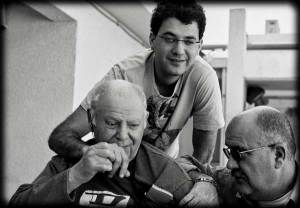 I can’t count how many times I have said to a client who is expressing a great deal of anxiety – anxiety way out of proportion to the situation, tinged with dread and reminiscent of early Woody Allen movies – “Oh, it’s genetic,” with that familiar flip of the wrist. But wait a minute. What once was humor is now the latest frontier in DNA and genetic research.
I can’t count how many times I have said to a client who is expressing a great deal of anxiety – anxiety way out of proportion to the situation, tinged with dread and reminiscent of early Woody Allen movies – “Oh, it’s genetic,” with that familiar flip of the wrist. But wait a minute. What once was humor is now the latest frontier in DNA and genetic research.
The new science of epigenetic inheritance is exploring the possibility that experience, particularly traumatic experience, alters the genetic activity of the next couple of generations. No one is exactly sure how this happens and the field is fraught with criticism and controversy, but something is definitely going on.
In one recent study, male mice were conditioned to fear a particular scent by shocking them after they were presented with the scent of almond-cherry. There were other scents presented to ensure that their fear was specific only to almond-cherry. Artificial insemination was used to impregnate females by these traumatized males so there would be no chance of social contact with offspring. Both the children and grandchildren of these mice expressed the same panic after their first exposure to almond-cherry scent as adults. When these poor creatures later had their brains examined, researchers noted additional olfactory neurons that were, indeed, altered to be more sensitive to the scent of almond-cherry.
The salient point of epigenetics is that it is the experience of prior generations that has a physical impact on later generations; it may not only be medical history or diet that influences the well-being of future progeny. Although this research is in its infancy, there is much to ponder. Older research has explored evidence suggesting that children and grandchildren of people who have experienced trauma via sustained abuse, war and the Holocaust also express evidence of trauma although they have not directly experienced it.
Popular psychology claims that traumatized people make poor parents and, although that may be the case in specific circumstances, it is often not the case and it behooves us to withhold judgment and to appreciate that everything is more complex than it seems. It wasn’t so long ago that the mothers of autistic children were vilified; even though we still don’t completely understand the mechanisms of autism, we are certain it is not “refrigerator mothers” that cause it.
Our understanding of human nature is ever-evolving. I keep hoping that as we learn more about epigenetic inheritance, we’ll find that it isn’t only about trauma but could also be about the best of what it is to be human. Trauma may cause dents and dings on our genetic code, but perhaps immersion in Miles Davis or Puccini, feasting our eyes on Michelangelo and Jackson Pollack, or reading the sonnets of Shakespeare will send some genes – crackling with color and humming with beauty – into the next generation.
 By Lani Scheman
By Lani SchemanLani is a Geriatric Care Manager in the Aging in Place program. She has worked with a variety of populations for over thirty years. Lani is a longtime resident of Capitol Hill, living with her partner Scott and a Chesapeake Bay retriever. She is interested in just about everything but has a special passion for literature, photography, book arts and the beauty of the natural world.
Feature image by Yoni Lerner.



